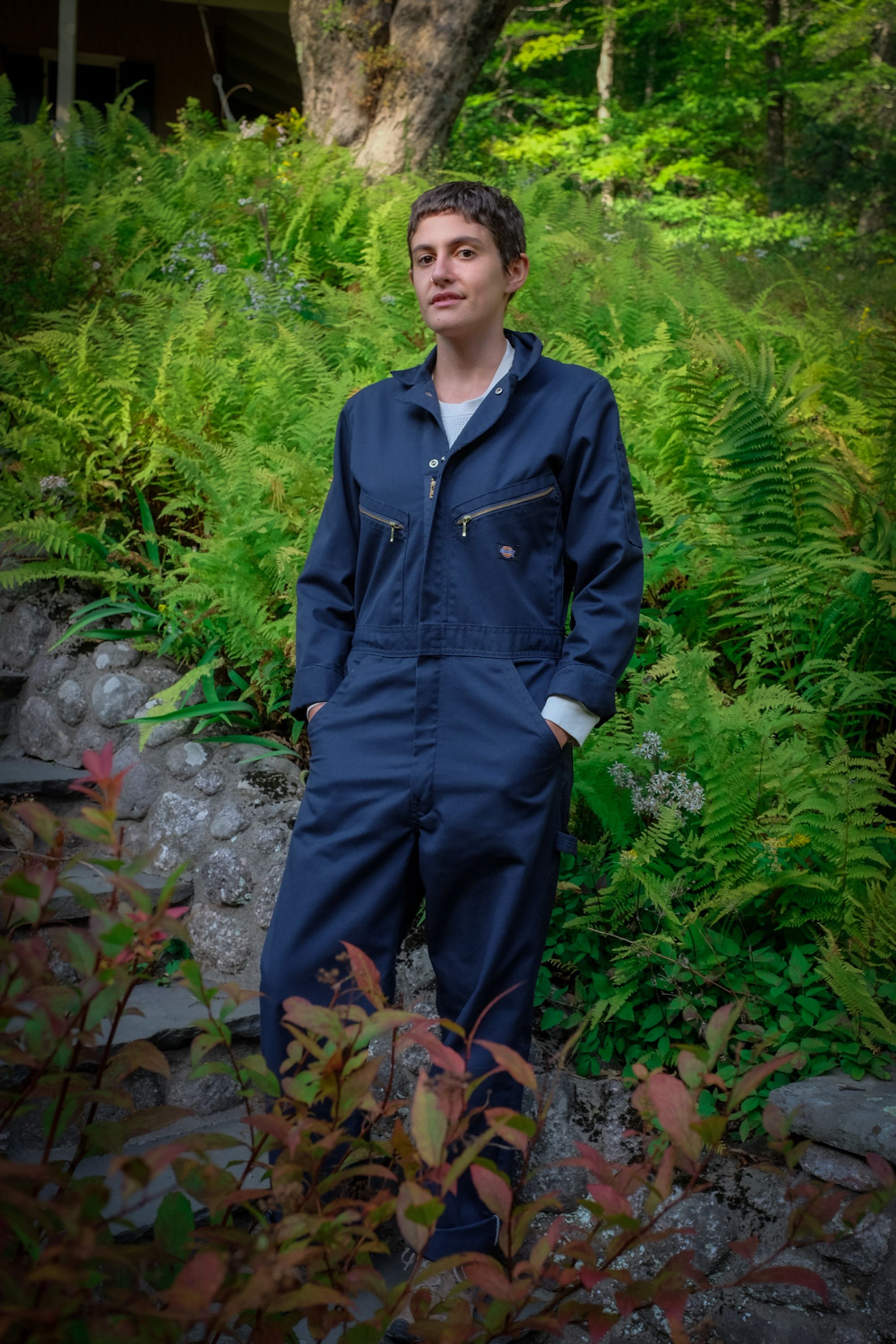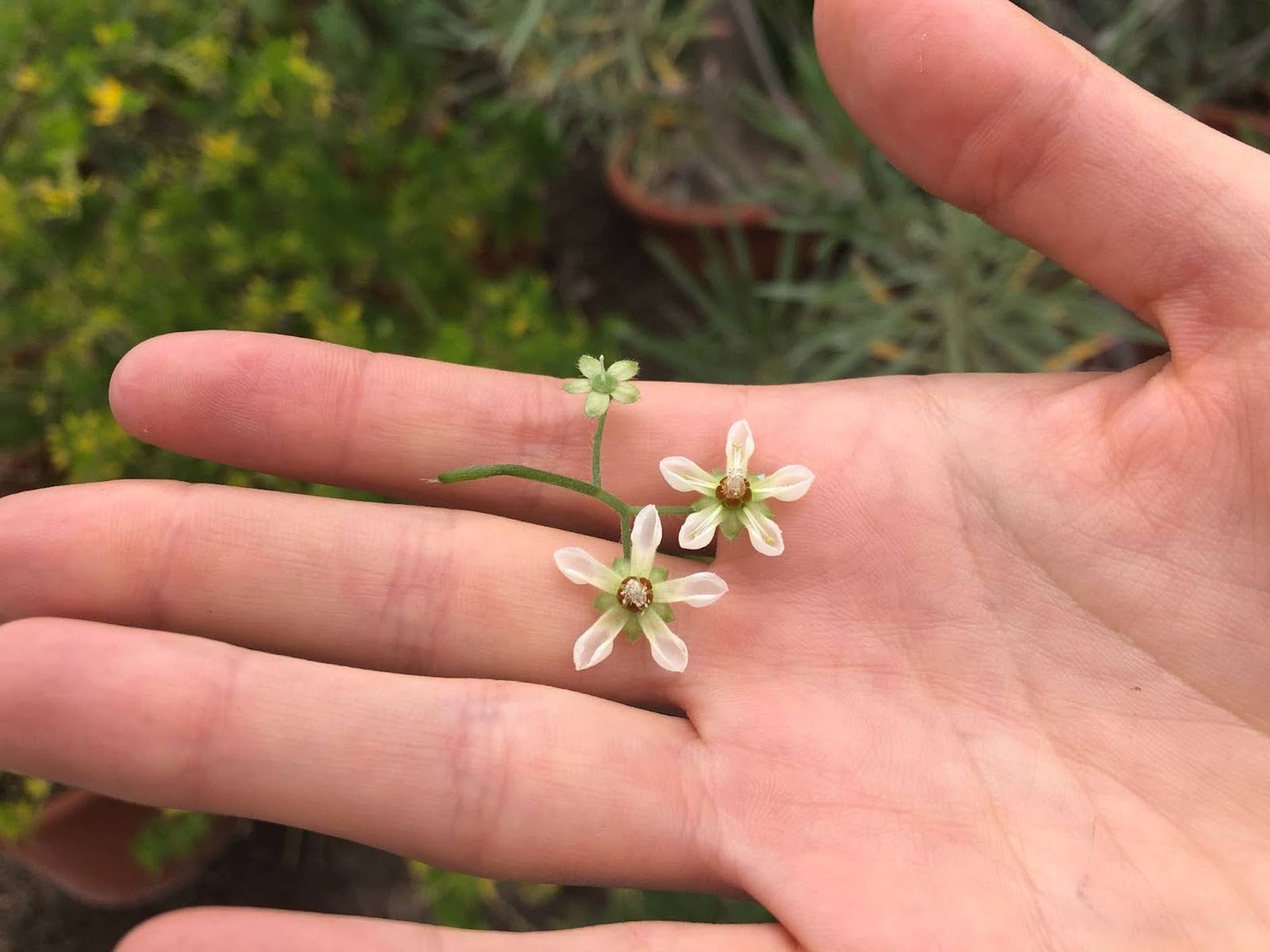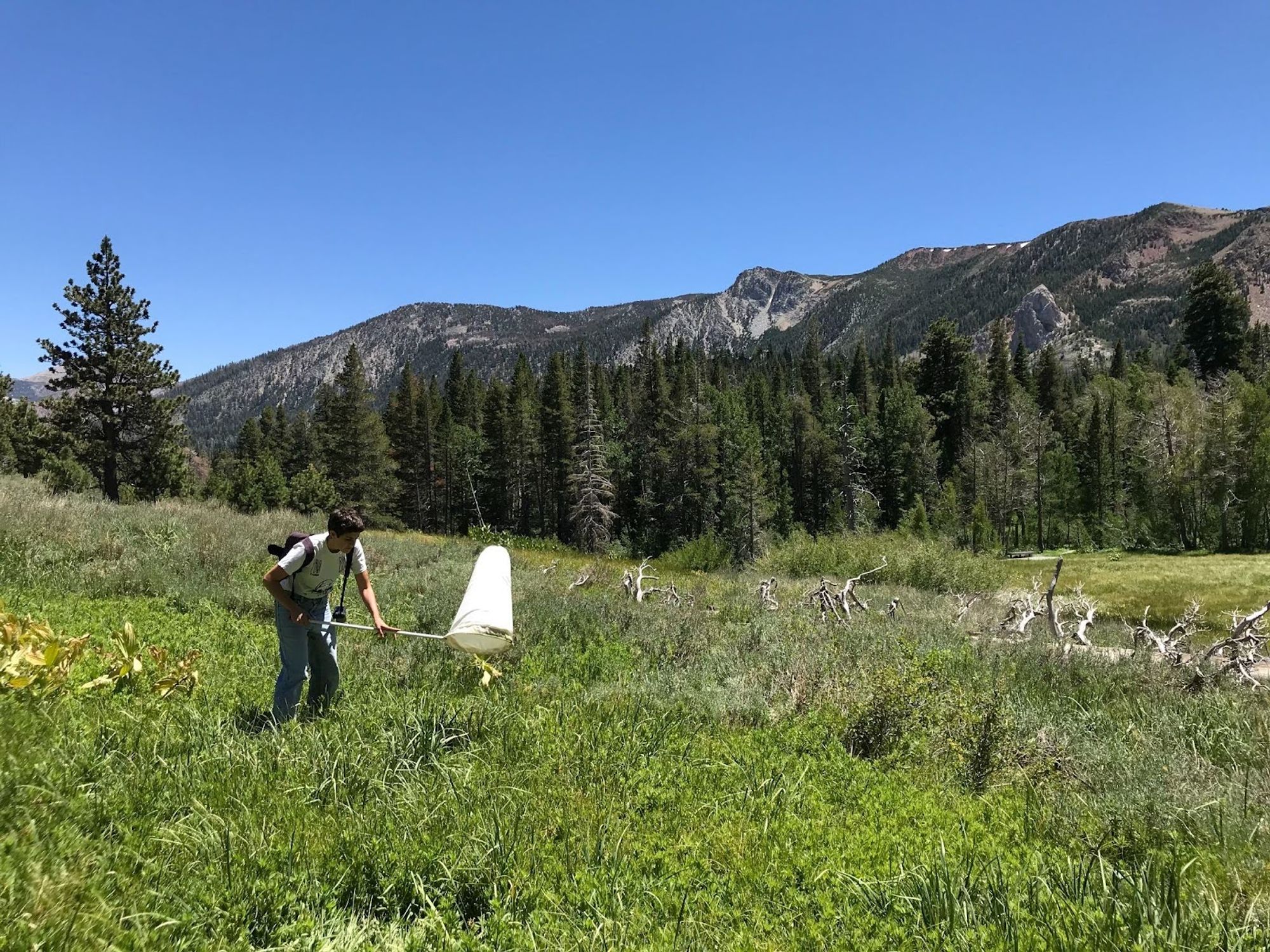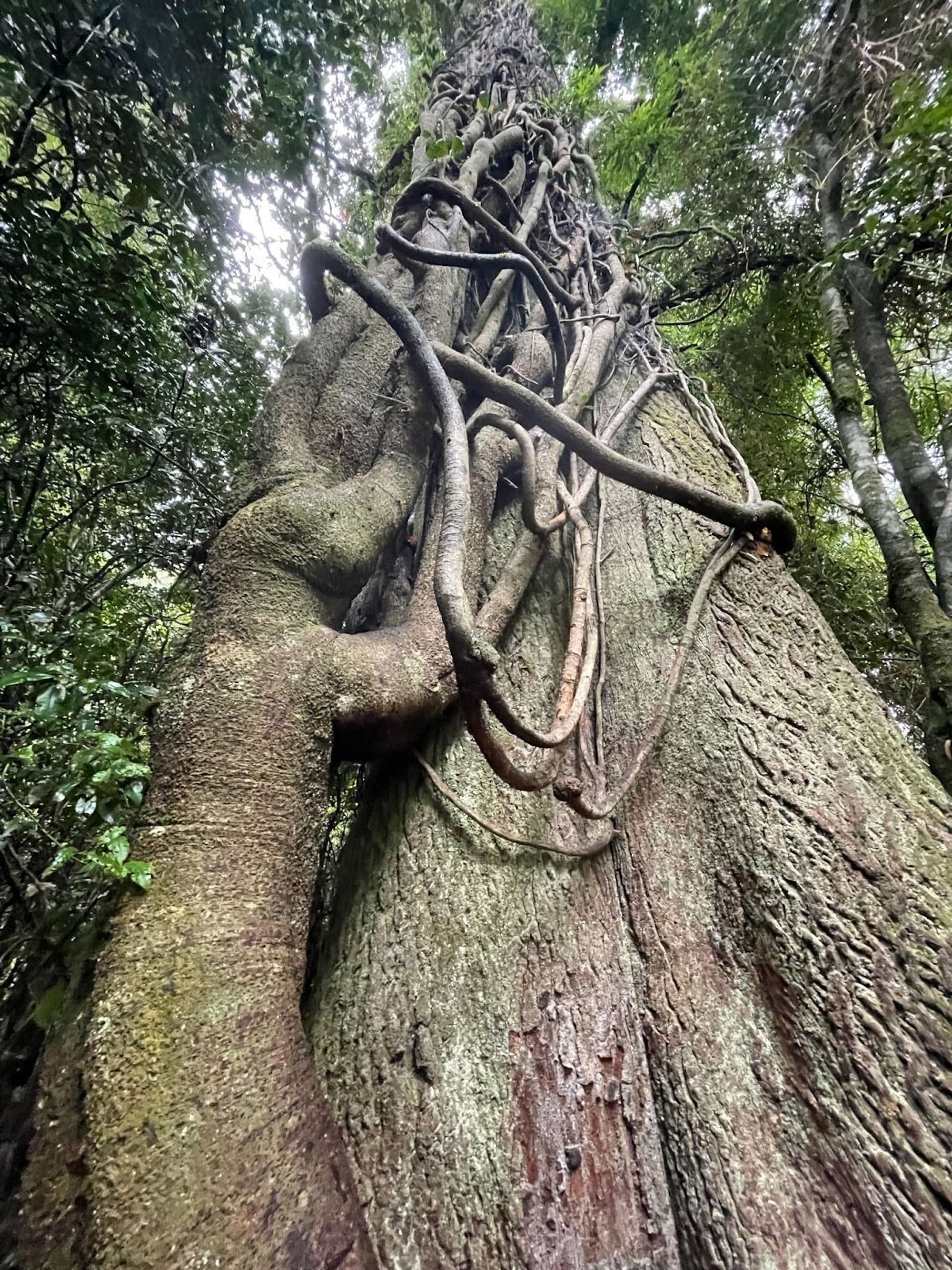What Do Plants Know?
The journalist Zoë Schlanger recently rode the subway with a potted white petunia in her lap. While it may have looked like ordinary vegetation, she knew a secret: the unassuming houseplant was one of the first-ever to be engineered to glow in the dark.
Glowing plants aren’t a brand-new concept for Zoë. She's a preeminent writer on cutting-edge botany; it makes sense that the company behind the bioluminescent petunia would send her an early specimen. In fact, while researching her book, The Light Eaters, forthcoming in May from HarperCollins, Schlanger spent time in a lab that uses biofluorescence as a way to visualize a plant’s ability to respond to stimuli. She was able to pinch a plant’s stem and watch “a green luminance” move through its small body in real time as it reacted to her touch. As she wrote for The Atlantic, where she works as a staff writer, “The experience permanently changed my view of plant life. Here was a lively, dynamic creature that absolutely knew I was touching it.”
The Light Eaters chronicles an expansive collection of recent, mind-blowing botanical discoveries. Touching on plants’ ability to communicate, be social, sense physical and auditory stimulation (i.e. feel and hear), and even remember, these studies collectively take on the controversial question of whether plants might be intelligent, or even conscious, beings. As Zoë writes in the book’s opening chapter, “The weight of this new knowledge is threatening to burst the walls of the container in which we place plants in our minds. Ultimately it may change how we think about life altogether.” It’s a lofty statement, but as a devout lover of plants myself, I was more than willing to accompany her rigorous reporting toward new understanding.
In advance of her book’s release, I sat down with Zoë to discuss the remarkable discoveries The Light Eaters chronicles, and parse through what her research might mean for our precarious, yet still wildly exciting, future.
I’d love to start with how you began researching plant intelligence as a soothing distraction from your desk job as a climate journalist.
After covering climate change for an online publication for a number of years, I started to feel bizarrely numb. While constantly writing about wildfires and chemical spills and melting ice sheets, I perversely came to view these travesties as “good stories.” My editor compassionately suggested I cover something else for a bit. Journalism is an endurance sport and he knew I needed a break.
That’s when I turned to reading botany journals. While I’d always been interested in plants, I had no formal background in plant science. But thrillingly, the more I dug in, I realized I’d stumbled on it at a moment when the field was rethinking itself. There were fights being had about whether or not a plant could be considered a “behaving organism,” whether it could be considered “intelligent,” and, much to my astonishment, there were even plant scientists talking about the concept of plant consciousness.
Now, any science journalist will tell you how circumspect scientists are. They're trained to be conservative as a way to avoid being misinterpreted. So reading articles in which actual scientists were proposing the possibility of plant intelligence, I was immediately transfixed.
Some history to add here is that in 1973, a popular book called The Secret Life of Plants threw the field of plant science into a tailspin—and not in a good way.
Right. You probably know people who talk to their plants, or who play their plants classical music. This is in large part due to The Secret Life of Plants, a work of popular science nonfiction that surveyed discoveries related to the possibilities of plant intelligence—much like my book, I have to say. The problem was that the majority of the book’s “scientific” studies were not fully vetted. Notably, there’s a profiled CIA agent who hooked up his houseplant to a lie-detector test before imagining the plant being set on fire. The book reported that the polygraph went wild, which implied the plant was responding to the man’s malevolent thoughts.
There were also passages about how plants enjoy classical music more than rock and roll, and other citizen-science studies that couldn’t be replicated by scientists afterwards. However, the public loved The Secret Life of Plants, and a lot of its ideas got stuck in our cultural subconscious. While this sounds like a fairly harmless outcome, it spooked the world of plant science to no end. Federal funding agencies simply stopped funding a lot of plant research if it gave off any whiff of being related to plant intelligence, and the field as a whole went underground for a good thirty-plus years.
The plant-intelligence revolution in botany reemerged about fifteen years ago, possibly because some of the earlier taboo had worn off—but also because technology has advanced such that a lot of these open-ended questions could be more rigorously investigated. But even now, if a scientist’s research points to plants being intelligent, it can be very hard to get them to publish their findings in ways that flat-out say that—even though they’re perfectly willing to anthropomorphize the hell out of plants in their own labs.
The rift between what ends up in science journals and what scientists themselves are willing to say is something that really interests me because it represents the trust that a researcher has, or lacks, in the general public. They're very wary of their message being misconstrued or exaggerated into some deformed version of itself. But I think there's a lot of interesting complexity there, too, and that the public should be trusted to cope with it, as long as they’re guided through the information responsibly. There's almost a hazard to not offering the public this more nuanced, somewhat philosophical view of plants as active creatures.

Zoë Schlanger at The Strange Foundation, where she worked on the first chapter of The Light Eaters.
Photo: Willa KöernerIn your book you write that “people can be trusted to handle a complicated truth,” but that truth is still scientifically fuzzy. We know that there's something highly intelligent going on with plants, and I almost feel like, if people could really understand that, it might alter our collective worldview to such an extent that scientists don’t want to be responsible for taking us down that path.
Totally. A hundred years ago, the disciplines of philosophy and science were much closer together. Scientists were “philosopher naturalists,” and were willing to expound upon the meaning of life, not just on the mechanics of life. This is no longer the case. Science and philosophy are now very far apart, which means science and ethics are also very far apart. There's a certain rigor that necessitates conservatism around these things, which—for the most part—produces incredible insights into biological life that we might not get otherwise. But it does mean there's a lot lacking in terms of dissecting what this all means for the public.
Even if your answer is purely speculative, I’d love to hear your thoughts about plant intelligence. Can you begin to put words to the alien-type of collective, connective intelligence that plants seem to exhibit?
“Intelligence” and “consciousness” are muddy words, and while I do think they could apply to plants, the word “agency” gets closest to what is actually happening. A being with agency makes their own life work. They're not passively receiving the environment—they are shaping an environment, and making decisions in real time. They're strategizing about how to best survive, and even how to thrive.
Writing this book has taught me so much. I now know plants have language, including regional dialects. They sense their kin, and respond differently to their genetic family members than to “stranger” plants, even if they're the same species. They can sense sound, and they have an exquisite capacity to synthesize chemical compounds. They can feel touch, which changes everything about how one interacts with a plant; now I know that when I touch my houseplant, it’s aware of that touch, and can even respond to it.
Consciousness has no scientific definition even for humans; we have not found any mechanical locus for it or quantity to measure. It’s still open season for the consciousness question in philosophy too. But we are colloquially comfortable with deciphering our own consciousness through inference—by speaking with a person and watching what they do. In this way, intelligence and consciousness are often registered as a certain ability to respond to stimuli. Plants do this constantly via decisions made about growth, or about what chemicals they exude through their pores. So while it’s true that the environment affects plants, it’s also true that they are acting on the environment in kind, and reshaping themselves in response. To me, that feels like a profoundly intelligent act.

Nasa poissaniana, a flower that is able to remember.
Photo: Zoë SchlangerYou explore this nascent idea that plant intelligence may somehow be decentralized—so that even though plants don’t have singular brains, per se, they can still process stimuli and make certain kinds of decisions. We’ve long thought of the human brain as our “mission control” for intelligence, but we're currently at a similar point as plant science, thinking of human intelligence as decentralized as well. It’s been proven that the microbes in our guts might have a close relationship with our mental health, for example.
The “brainless mind” is the most exciting possibility that I think will become basic knowledge in the next ten years. Much of the debate in plant science revolves around the fact that plants don't have brains, so, “How could we consider a brainless organism intelligent?” But when you think about how plants evolved, always rooted in place, we realize it makes sense for them to evolve to have sensory capabilities throughout their bodies.
Think of an octopus, which has many arms with neurons that seem to act quite independently of the octopus’ main brain. We see this in fungi as well, which of course are not plants, but they’re another reference for a kind of organism that seems to have a non-centralized, network-based sense of their world and themselves. The possibilities of this are extensive.
One of the biggest challenges of this book was that I set out to write about plants, and quickly realized that where a plant ends, and where other organisms begin, or where its environment begins, is hard to parse. Plants are incredibly porous and so suffused with everything around them. There's fungi and legions of microbes hooked into their root systems and all over their surfaces. There are viruses working on them and they are working in turn on those viruses. It really questions the concept of the biological individual.
We're finding now that fungi can control things about a plant that we thought were fundamental to the species itself. For example, imagine a plant that thrives in salt water. That characteristic would be a hallmark of that species. Well, in some grasses, we're now finding that that particular capability is caused by a fungi, and if you put that fungi in grass that isn’t able to grow in saltwater, it will then develop the capacity to tolerate saltwater. What is this amalgam of biology? Is it a plant, or is it something else altogether?
It’s similar with humans. About half the cells in our body are genetically ours, and half are foreign DNA—but we wouldn't be ourselves without them. They're causing so much of our lives to happen, and then when you think of that in the context of intelligence, what does it mean that our brain is not controlling most of these organisms? They're part of a diffused network of less-centralized intelligence that is affecting our mood, aiding digestion, and much more. We like to draw a line between rote reflexes in the body and behaviors that are influenced by our own conscious will—but what happens when microbes are causing depression, or attraction? It starts to really blur the boundary between mind and body, and opens up space to think about other forms of intelligence that completely sidestep the structure of the brain.
This way of seeing the world is exciting to me, because in many ways, binaries and individualism and competitiveness—all things that come out of the survival-of-the-fittest mentality—are directly responsible for the collapse of so many parts of our world. Seeing the science start to back up this sense of vast interconnectedness—there's something healing about it.
In talking to ecologists for this book, I learned that the common idea of competition driving evolution may be quite overstated. Even Darwin didn't put that much emphasis on competition, although those are the parts of his work that really get quoted. Ecologists are now finding that while competition does drive community makeup, or influence which species dominate, that's only one element. And actually, collaboration may be a bigger driver of evolution—which completely remakes our vision of the natural world, and the world that we've modeled our own societies off of.

Zoë Schlanger catching grasshoppers for a field experiment by UC Davis ecologist Rick Karban in Mammoth Lakes, CA.
Photo by Rick Karban.I have to ask you about your house plants, which you write about “quizzically eyeing” as your research started to make you rethink your responsibilities to them. I was doing the same thing while reading your book, and starting to feel a bit guilty, like, “Have I committed some kind of crime by potting up these plants and keeping them sequestered in my house?”
After several months working on the book, I was sitting on my couch looking around at my plants, thinking, “If I apply what I just learned about plant communication to my house plants, these creatures are cut off from below-ground communication. I did that to them.” It was an eerie moment.
But these plants were grown in nurseries from long lineages of plants grown in nurseries, so I think it's very loosely a bit like having a pet dog that's been so far removed from its wolf lineage that now it can’t survive without human care. And that's certainly the case with all of the plants in my house—they absolutely wouldn’t survive without me. We’ve forced them into becoming this feeble version of themselves, and now we just have to take care of them as best we can.
It makes me wonder, as we start to understand the unique kinds of intelligence that plants have, do you think there's the potential to have something like a plant code of ethics?
Definitely. Once we bring plants into our moral consideration, it'll be impossible for there not to be some regard for the needs, or the rights even, of plants. There's some legal precedence for this already. In my book I describe a lawsuit where the White Earth Nation of Ojibwe sued the State of Minnesota on behalf of wild rice, arguing that the rice had an evolutionary right to flourish, and that the building of a pipeline through the rice's habitat would threaten its ability to do so.

A Hydrangea serratifolia vine climbing a tree in the Chilean rainforest, captured by Schlanger on one of her research trips.
Overall, there's a lot of scholarship now around “Earth Law,” the idea that animals, plants, rivers, and other wild ecosystems have inherent rights that go beyond their utility to people. So I think once we start recognizing plants as desiring, acting, decisioning beings with needs and preferences, it'd be impossible not to start considering the ethical implications of how we treat them. These kinds of changes are hard to picture until they actually come to fruition, but I do think we'll see a big change in this regard in the next decade.
As my last question, I want to discuss how you’ve come full circle—you're back to having a full-time climate journalism job. But now you’ve written an entire book on plant intelligence. How are you dealing with your climate grief these days? Do you feel differently about it now?
Learning about plants has given me access to a sense of enchantment with the world that I hadn't felt since I was a child. I now also have a deeply felt sense that evolution is not a linear project with humans as the pinnacle. On the contrary, evolution is this riotous seeking-out of every possibility; it's an incredible, absurd chaos of unending mixture.
This sense that every creature that biology has come up with is a form of ingenious life-hood makes the potential climate-change-induced losses feel much more materially real and devastating to me. I now understand why it would be a tragedy to lose a rare plant species. It's not something that's necessarily obvious—or at least it wasn't obvious to me why this botanist I met in Hawaii, for example, was repelling himself off of cliffs to hand-pollinate a species of flower that would otherwise go extinct. Why go through such incredible lengths to save something that humans didn't even know existed until a few years ago?
What we stand to lose as a biological collective is much more obvious to me now, and it has absolutely changed how I cover, and how I think about, climate change. I'm left with a deep sense that every form of life is very worth our efforts, even while biological creativity will persist no matter what happens. ♦
Subscribe to Broadcast